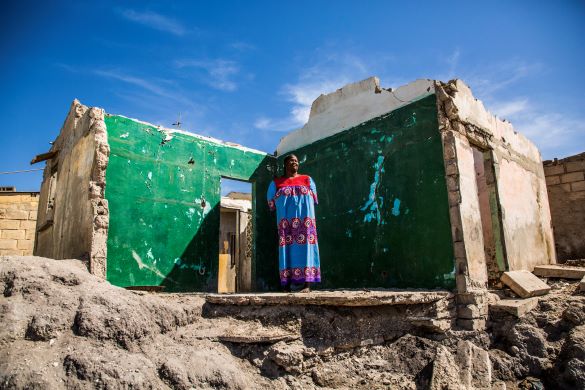Trier les resultats par: Article le plus récent
-
Publication
Deux écoles construites par le projet WACA à São Tomé et Príncipe.
Auteur: by Arlindo de Carvalho, WACA Coordinator São Tomé and Príncipe
Deux écoles construites par le projet WACA à S.Tomé et Príncipe ont été inaugurées par les autorités gouvernementales du pays.
-
Publication
WWF plastic pollution in Africa: identifying policy gaps and opportunities
Auteur: WWF
There is currently no comprehensive report or reference available on the state and impacts of plastic pollution in Africa specifically, or on the policy and legal frameworks required to address this challenge from an African context and perspective. This report aims to fill this knowledge gap by providing a brief glance at the plastic pollution challenge in Africa, the policy options available to address it and recommendations on the policy frameworks still required to tackle the challenge urgently, holistically and in a coordinated manner. This report is primarily aimed at policymakers and experts working in the plastic policy landscape in Africa.
-
Publication
Plastics sector competitiveness strategy and action plan for Côte d'Ivoire
The use of plastics has increased twentyfold worldwide in the last 50 years and is expected to double
in the next 20 years The food packaging, medical, automotive, electronics, building construction, agriculture and textile industries all make extensive use of plastics It is widely recognized that plastics play a crucial role in a sustainable future. -
Publication
Insights on healthcare plastic waste management in Lagos State, Nigeria
Given the increased use of plastics in the healthcare sector, this study aims to understand current practice and provide recommendations. Survey conducted to understand current practice and provide recommendations in healthcare plastic waste management in Lagos.
-
The physical, social and economic impacts of coastal erosion in Saint Louis, Dakar, Gorée and Ziguinchor
Auteur: World Bank, WACA
Produced by the Waca ResiP Senegal Project, this video highlights the consequences of coastal erosion in Senegal and will serve to measure the real impact of physical and social investments aimed at protecting coastal communities from the sea's advance.
-
L' impact de l’érosion côtière sur le plan physique, social et économique cas de Saint – louis, Dakar, Gorée et Ziguinchor
Auteur: World Bank, WACA
Réalisé par le Projet Waca ResiP Sénégal, cette vidéo met en exergue les impacts liés à l’érosion côtière au Sénégal et servira à mesurer l’impact réel des investissements physiques et sociaux visant à protéger les communautés côtières face l’avancée de la mer.
-
Video
Regional fisheries project in West Africa: the case of Guinea Bissau
Auteur: World Bank, WACA
In 2011, artisanal fishing employed nearly 26,000 people in Guinea Bissau.
-
Video
Le projet regional des pêche en Afrique de l'Ouest: cas de la Guinee Bissau
Auteur: World Bank, WACA
En 2011, la pêche artisanal a employe près de 26000 personnes en Guinee Bissau.
-
Publication
Operational Brief Overview Blue Economy for Resilient Africa Program
Auteur: World Bank, PROBLUE
The Blue Solutions for Africa series of operational briefs captures how a thriving Blue Economy can help African countries better manage the development challenges they face while supporting economic growth, sustainable livelihoods, and the health of these precious ecosystems.
-
Publication
Operational Brief: Climate Change and the Blue Economy in Africa
A robust Blue Economy could protect Africa from the worst effects of climate change. At the same time, the effects of climate change are already preventing the continent from achieving the full benefits of a vibrant Blue Economy.
-
Publication
Operational Brief: Coastal and Marine Biodiversity and Ecosystems
Auteur: World Bank, PROBLUE
Governance also plays an important role. Coastal areas and territorial waters are under the jurisdiction of several agencies that lack sufficient coordination and incentives to improve the management of natural resources. Marine spatial planning is an important tool to improve such governance.
-
Publication
Operational Brief: Marine Pollution
Auteur: World Bank, PROBLUE
The solutions include promoting a circular economy approach, improving solid waste infrastructure and services, and strong monitoring of plastic pollution for proactive action and removal. For wastewater, the use of practical low-cost technologies, with an emphasis on circular economy approaches, is gaining attention.
-
Publication
Operational Brief: Sustainable Fisheries
Auteur: World Bank, PROBLUE
Stronger capacity for sustainable fisheries management could involve working with fish farming communities to adopt climateresilient aquaculture or mariculture, and implementing climate adaptation programs to strengthen the fisheries value chain.
-
Publication
Operational brief: Marine Spatial Planning
Auteur: World Bank, PROBLUE
Marine spatial planning can help design coordinated coastal resilience programs at scale and identify possible lowcarbon development and growth pathways. This type of spatial planning can integrate measures articulated in nationally determined contributions and other instruments, budget for those measures, and monitor their progress.
-
Publication
Operational brief: Knowledge, Data, and Information
Auteur: World Bank, PROBLUE
Improving the organization of—and strengthening access to—data and knowledge among governments, the private sector, academia, civil society organizations, financiers, and the public will help generate multisectoral, spatial, and sustainable development insights and attract more financing, including from the private sector and other development partners.
